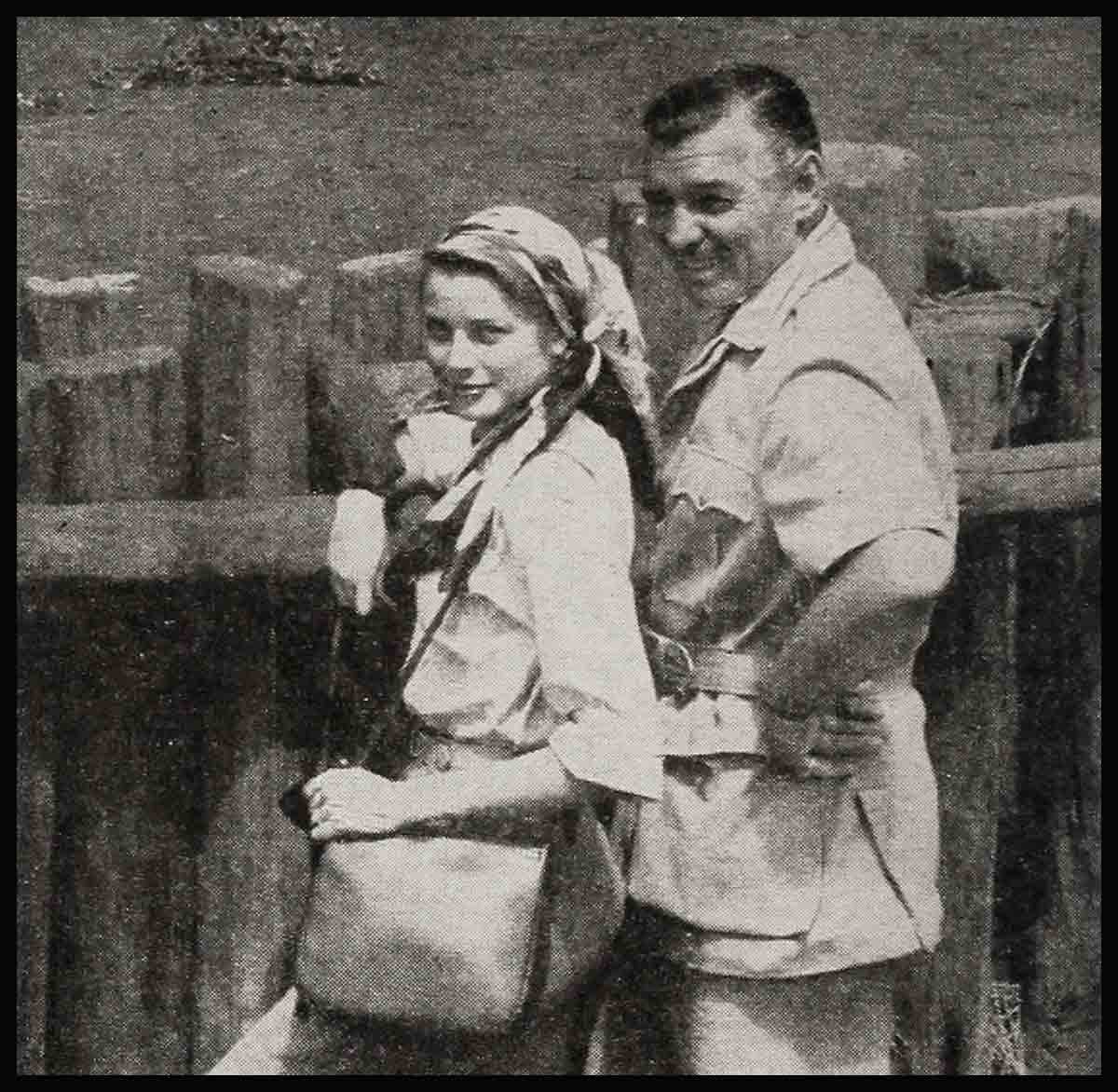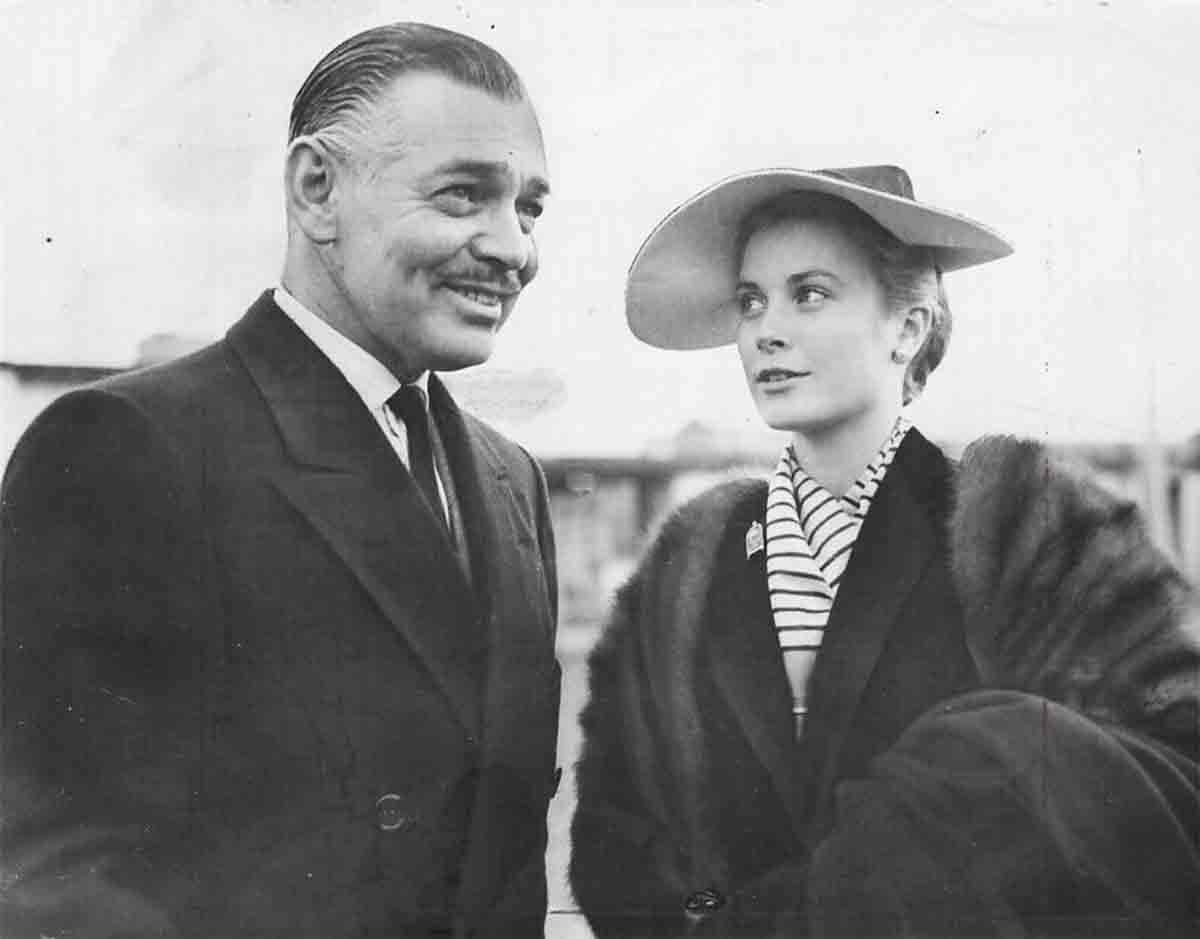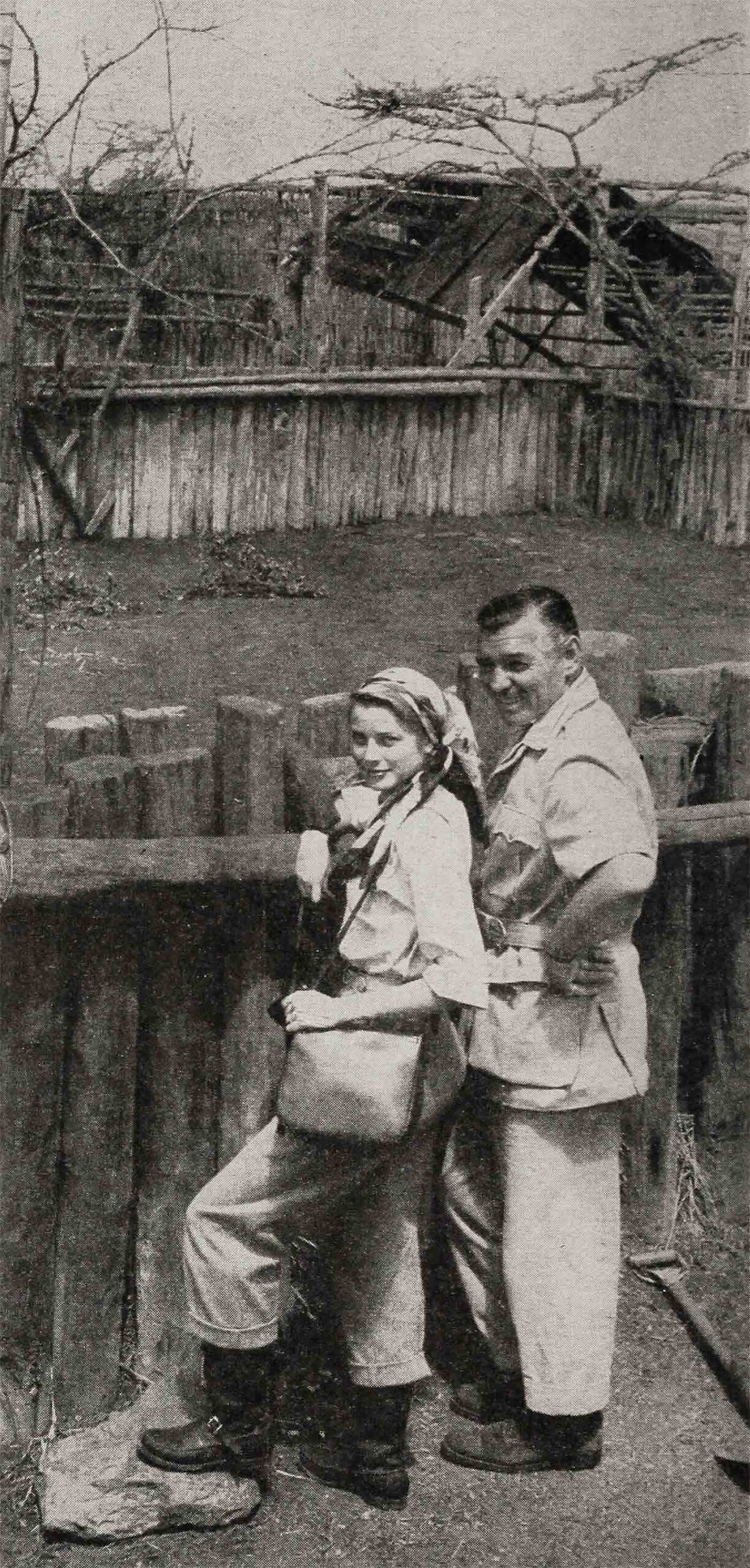
Clark Gable And A Girl Named Grace Kelly
If he had not become an actor, and a darn good one, Clark Gable would have made a superb diplomat.
He is charming, tactful, smooth as nylon, and so sincere when denying an allegation, so altogether credible and downright that to doubt him seems like heresy.
You say to him, “What goes with you and Grace Kelly? I understand the two of you were virtually inseparable all through Africa and London? There’s even a rumor that you and Grace have some sort of understanding, maybe an engagement?
Gable fixes you with a manly stare, shakes that handsome temple-gray head of his and says flatly, “That’s absurd. The whole story’s fantastic. Just because we’ve made one picture together and we’ve been out a few times. She’s a very lovely girl and a fine actress, but that’s all there is to it.”
If his history with women were not so replete with similar denials, one might accept Gable’s protestations and admit that his friendship with blonde, young, beautiful Grace Kelly is purely professional. Except that a few years ago when he was going with Lady Sylvia Ashley and was asked if he contemplated matrimony, he told reporters, “Now, look, boys, she’s a very fine woman and I enjoy her company. But insofar as anything serious is concerned, that’s out.”
Even when he was paying his second wife, Maria Langham close to half a million so that he could be free to marry Carole Lombard, Gable was still shy about admitting his love.
“Carole and I are good friends,” he said at the time, “but I’m in no position to discuss marriage or love or anything like that. Say we’re just good friends and leave it at that.”
On the basis of his established record, it is safe to say that when Gable insists his relationship with an attractive female is casual, it usually is not. For The King, as Spencer Tracy refers to him, has always been a one-woman man—that is, a one-woman-at-a-time man.
When he courts a girl, he concentrates on her. He gives her all his ardor, all his non-working time. No diversification for this gentleman. He makes a girl feel as if he is living for her, only for her.
In the case of Grace Kelly, members of the Mogambo crew insist that during the preparation and making of this film, “Gable had big eyes for Grace.”
In Nairobi and all through Kenya, at Thika, Ramuruti, and Lake Naivasha, all through Tanganyika and Uganda, it was Gable and Kelly who paired up, Gable doing everything he possibly could to make things easier for the lovely blonde from Philadelphia who was playing her second large role in motion pictures. Her first was as Gary Cooper’s wife in High Noon.
When the location-shooting was finished in Africa, Gable and Grace flew back to Europe. When the picture was resumed in London, reporters and columnists, catching the twosome together at theaters and social functions, also spread the word that The King had found himself a new girl.
During the entire shooting of Mogambo, Grace Kelly was mentioned as the woman who had stolen Gable’s heart.
As a matter of fact, she was Clark’s constant date. There was no hiding that. In London when they attended Her Majesty’s Theater to take in Paint Your Wagon they were surrounded by so many fans who kept talking about “Clark Gable and his new sweetheart” that the manager of the theater had to extend the intermission 30 minutes while Gable and Grace signed programs for eager autograph collectors.
A few nights later when I ran into them at the New Theater where they’d gone to see Dear Charles, Gable was irritated when photographers insisted upon shooting him and his young lady. He scowled, bent his head down, and escaped through the crowd.

In London Clark Gable usually lives at the Savoy Hotel. Since Grace Kelly stayed at the same place and the gossip linking these two became so strong, Gable moved into the Connaught, a conservative hotel several miles away. A week or so later Grace’s mother arrived from Philadelphia.
When Grace Kelly was asked if she were in love with Gable or he with her, she said, “I’m afraid not. That’s just a rumor and there’s nothing to it. Mr. Gable is a very fine gentleman, and he’s gone out of his way to help me in this picture. Because of that and because of working with a great director like John Ford and a talented actress like Ava Gardner, this has been a wonderful experience for me.
“Yes, Mr. Gable and I have been out together, to a few plays, things like that, and we spent a lot of time in each other’s company in Africa, but actually, it’s been very hard work on this film, and there hasn’t been much occasion for relaxing.
“I don’t go out with Mr. Gable regularly, and he doesn’t go out with me steadily. He’s just a close friend, but the rumors have magnified everything into a tremendous love affair. I’m afraid it’s not.
“When this picture is over I’ll be in New York, and Mr. Gable will probably be touring the Continent. I can tell you that we’re not engaged, just close friends.”
Supposedly, the actor’s next picture, following Mogambo, is Green Fire, this one to be shot in South America so that Gable can stay out of the United States for 18 months and earn a few tax-free dollars; and somehow it would surprise no one if the 52-year-old star requested this tall, stately, well-bred blonde, not even half his age, to play opposite him; for romance or no romance, Grace Kelly is one of today’s finest young actresses.
Moreover, she is an intelligent, worldly, sophisticated young woman of excellent background, and that’s the type of girl Gable specializes in, albeit he has picked them much older in the past.
Grace Kelly is the daughter of the John Kellys of Philadelphia. Her father is one of the best-known building contractors in that city, and her brother Jack is an Olympic oarsman who twice won the Henley regatta in London, once in 1947 and again in 1949.
Her uncle is George Kelly, the veteran Broadway playwright who wrote such hits as Craig’s Wife, which won a Pulitzer Prize, and The Showoff.
She did her first stage-acting as a child of 11 and in 1947 left Philadelphia for New York where she attended the American Academy of Dramatic Arts for two years.
Grace was a very apt pupil and after reading for Raymond Massey who was directing a Broadway play, The Father, she won the role of his daughter. Massey at the time, said, “In my opinion Grace Kelly is going places as an actress.”
His prediction proved correct. The tall, blue-eyed natural blonde was spotted: by a 20th Century-Fox talent scout one night and tested for a part in 14 Hours, a film starring Paul Douglas. Grace got the part easily. Business was slow, however, and there were no further movie roles, but since she is not a poor girl, Grace had the necessary for further dramatic study. She played Bucks County and then went west where she acted in Denver’s Ellitch Gardens which is known as the graduate school of summer stock.

Fortunately for Grace, Hollywood producer Stanley Kramer was looking around for a young actress who was young, pretty, and talented but would take relatively little in the way of salary. He had a western ready to go entitled High Noon. The star of the picture was Gary Cooper whose financial demands are always astronomical. Cooper had agreed to star in the film for $50,000 and 20% of the profits, a deal which will probably net him a half million.
Because Grace hadn’t had very much film experience, her salary hovered about the $250-a-week mark.
Kramer, who is always willing to take a chance on youngsters, signed Grace for the femme lead. She was nothing but sensational. When High Noon was finished, Cooper said, “This girl has as much potential as any actress I’ve played opposite—a great talent.”
Now all you need in Hollywood is one big fat hit, and your agent can start making demands and mulling over the various offers that begin to cataract. Grace went back to New York, picked up some fast dough on television, and the high pressure boys from MCA began scouting around for her in Hollywood.
The Music Corporation of America represents dozens of actors, one of the most valuable being William Clark Gable. When Gable was assigned to Mogambo, the story of a triangle in which a white hunter fools around with a lady and a fast girl, and decides in the end that the red hot baby is for him, MCA asked for the identity of the two women who were to play opposite him.
Twenty years ago Gable had made this story under the title of Red Dust. At that time Jean Harlow had played the vamp and Mary Astor the married lady.
MGM told Gable’s agent that Ava Gardner was scheduled to play the Jean Harlow part, but that they had no one for the Mary Astor role. In fact, they said, the British Government wanted them to use British actors and actresses wherever possible.
MCA asked Gable if he had any objections to Grace Kelly. Gable said, “No, she’s great.” Whereupon Miss Kelly was offered to John Ford, one of the few really great motion picture directors in Hollywood. After seeing some of Grace’s work, Ford nodded, “She’s good enough for me.”
Grace Kelly was flown to Europe, thence to Nairobi in British East Africa, and then 750 land miles out into the bush country. It was in this location that she and Gable became “fast friends.”
Ava and Grace were the only two white female stars on the trek, and at night Ava used to hang a lantern outside her tent to scare off the lions, and in this sort of potentially dangerous environment, Gable took on the halo of the protector.
Africa or no Africa, The King is a pretty romantic guy anyway you look at him, and in the span of five weeks’ time, Grace Kelly was looking at him plenty.
By the time they hit London, the rumors coupling these two in a torrid romance were in full force. They were so prevalent that Gable became annoyed at them and refused to answer questions concerning his love life.
Reporters are adroit by profession, however, and would start their questioning along this line. “Are you really happy without a wife?” Gable’s answer to that one was a fast yes.
“How do you feel about marriage generally? That is, you’ve been burned a few times.”
“I’ve always believed in marriage as es best state for man and woman, and I believe in it now. If the right girl came along and I fell in love with her and she with me, I certainly would marry again.”
Mindful of the fact that each of his four wives had had money in her own right, one reporter asked the actor how he felt about a wife who had an independent income.
“If a marriage is right,” Gable answered, “a husband will maintain his authority regardless of his wife’s income or wealth.”
“What qualities are you looking for in a wife, Mr. Gable?”
“I’m looking for a woman who has brains, beauty, breeding and a good sense of humor. I’d like her to know her way around both in and out of the home. I myself don’t go in for much entertaining but if entertaining makes her happy she can do all of it she has a hankering for.”
“After you finish Mogambo what are your plans?”
“I left my car back in Rome. I’m to pick it up, drive through Spain and then settle down in a little house I’ve rented in Majorca. Did I mind the discomfort in Africa? Heck no. A lot of people were bellyaching about conditions, but I loved the whole setup, sleeping on a cot, the mosquito netting, washing in a canvas basin, even hunting. I shot a crocodile and a python, and a few other animals, but I’m really more of a fisherman than a hunter. Basically, I’m a lazy man, and I guess all lazy men love to fish.”
“Just one more question, Mr. Gable. Is there any truth to the rumor that while you and Grace Kelly were on location you fell in love with her and that she is currently your girl?”
The King’s eyes flashed, his teeth came together, and he shook his head. “That’s absurd,” he said a moment later. “Right now I’ve got no girl.”
People in Hollywood who know Gable best, however, and there are surprisingly few who know him relatively well, insist that Gable always has a girl, that a womanless life for him is as likely as a s one is for Tommy Manville.
THE END
—BY ALICE HOFFMAN
It is a quote. MODERN SCREEN MAGAZINE JULY 1953




